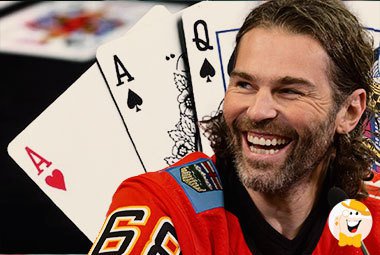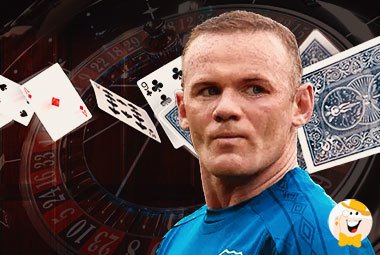![Elite Athletes & Gambling Habits: Most Famous Juggernauts in Sports History [The Magnificent Seven] (Part Two)](https://a1.lcb.org/system/modules/news_story/images/attachments/000/294/244/original/elite_athletes_and_gambling_habits_part2.jpg)
In a manner of fast-paced table game, we’re continuing our two-part series in medias res assuming you’ve already checked Part One. Thus, with no further ado…
John Daly
Possibly the most unexpected major championship winner in modern history of PGA — the ninth alternate in 1991, who qualified after all others pulled out while the birth of competitor’s first son and ensuing withdrawal freed up the caddy — John Daly is the first professional golfer to average more than 300 yards per drive in a full season, repeating the feat from 1999 to 2008.
While Tiger Woods’ accomplishments better fit the mold of an elite athlete, Daly is a sports superstar; his juggernaut gambling proclivities fully compensate for the lack of his pro events wins.
As Washington Post tells the story, John Daly lost close to $53 million while gambling between 1991 and 2007.
Most of his losses came by one-armed bandits and blackjack.
In 2005, after winning $750,000 at the World Golf Championship in San Francisco, Daly went straight to Sin City and lost $1.65 million in five hours while playing slot machines betting $5,000 per pull.
Once he played for two days straight without taking a break, noting that “double diamond machine with a cherry” at the Wynn casino in Las Vegas was his favorite.
When it comes to twenty-one, Daly preferred to take the entire table for himself; he’d play seven hands at a time, betting between $5,000 and $15,000 per hand.
As Forbes writes, he partially owes not being totally broke after such a compulsive approach to gambling to — tax returns. Namely, Daly itemized his losses together with winnings on taxation forms, which enabled him to at least somehow control the damage.
(On the side note: understanding the gambling win/loss taxation statements is of paramount importance.)
Another saving method in his, dare we say, betting madness, was the implementation of stop-loss limit he enforced on himself, quite a useful illustration of players’ self-protection and awareness when it comes to addressing gambling problems.
According to Daly, he nowadays rolls $25 per hand; when he hits something big, he might up bet to $100, but once he reaches the limit, he leaves the casino.
While he doesn’t regret his losses in the past, possibly due to the steady revenue stream from his off-course status, Daly values entertaining experience gambling provided him with. Still, fifty-three million dollars?

Jaromír Jágr
Two-time Stanley Cup champion, five-time Art Ross Trophy winner (four times in a row) — the only hockey player to win the leading point-scorer title between 1981 and 2001 not named Wayne Gretzky or Mario Lemieux — one of only 28 others in the Triple Gold Club and 2nd player on the list of the most points in the NHL history…
Jaromír Jágr is one of the greatest professional hockey players of all time.
Equally progressive off the ice, Jágr was perhaps the very first elite athlete which entangled his millions in the net of online gambling, exploring unregulated waters of iGaming as a frequent “recreational gambler,” as Bill Daly, NHL’s chief legal officer, described him.
As Washington Post reports, Jágr enjoyed gambling at land-based casinos in the late 1990s.
He was frequent at Las Vegas MGM Grand and Bally’s, in addition to being extended a $500,000 credit line for private baccarat table sessions at Caesars’ in Atlantic City.
With the advent of the internet, Jágr switched to online sports betting at CaribSports site and accrued $500,000 in debts between 1997 and 2000. After back and forth negotiations resulted in website reducing his debt, Jágr proposed to make one lump-sum and nine monthly payments totaling $450,000.
However, the highest-paid player in the NHL at the time — owing $3.3 million to the IRS in back taxes for 2001 at the same time — stopped making payments.
Using publicity, peculiarly effective tool elite athletes dread, “someone at the betting site leaked the story,” in order to kick-start Jaromír. In the summer of 2002, the matter was resolved.
In 2006, reflecting on his iGaming mishaps, Jágr admitted the total settling amounts were actually close to $950,000 and involved two websites.

Wayne Rooney
The record goalscorer for Manchester United and the national team is one of only two English players ever to win every trophy in soccer except the World Cup — the Premier League, FA Cup, UEFA Champions League, League Cup, UEFA Europe League, and the FIFA Club World Cup.
Only Alan Shearer has scored more goals in the Premier League than Rooney. A four-time winner of the England Player of the Year award is also a second most-capped player for the England national soccer team (Peter Shilton played five more games).
Wayne Rooney also probably holds the record for the fastest and largest gambling loss among elite athletes on the British Isles. In 2017, he lost £500,000 in two hours; that’s $317,000 per hour.
As The Sun elaborates, Rooney arrived at 235 Casino in Manchester alone, around midnight, and played exclusively blackjack and roulette.
Switching between the two, according to eyewitnesses, he bet more than £4,000 per minute. Aggravated by losses, he apparently started gambling recklessly, placing huge straight up bets on roulette wheel.
“He was chasing his losses, which was just making things worse for him. People at the casino were looking at him and were stunned at what was happening. He was cursing under his breath and seemed to be in his own little world — fixated on the tables and all the machines around them.”
With Rooney’s VIP status and a private account in the casino — which is an indicative sign about the frequency of his visits — management took good care of England’s captain in order to keep it under the wraps, but the story leaked.
The astonishing amount of money lost probably was not his greatest worry and fear, although he took it really hard. Neither was the fact that spree came after a series of gambling scandals rocking the UK soccer scene.
The single greatest ensuing problem in Rooney’s world was — facing his wife Coleen, who was away on a trip to Europe with their three children.
A “sensible and successful businesswoman”, she already clashed with Wayne about his betting bills in the past. In his autobiography, Rooney recalls her being furious about £50,000 gambling loss at the beginning of his career. As a source close to family noticed, “I wouldn’t want to be in Wayne’s shoes when Coleen finds out.”
Considering she announced the birth of their fourth son on her Twitter account in February 2018, it appears that Rooney somehow managed to dribble his gambling proclivities successfully.

Art Schlichter
The most extreme case on our list and the most notorious gambling episode is reserved for All-American quarterback at Ohio State who led Buckeyes to the undefeated regular season in 1979, and was, by all football accounts, looking forward a prosperous NFL career being drafted No. 4 overall pick in 1982.
Sadly, Schlichter’s compulsive gambling prevailed and spiraled him down to four decades of addiction, losses, fraud, forgery, and corrupt business practices during which he disintegrated his marriage, pawned both wedding rings, stole from family and friends, and eventually served more than 20 years in 44 county jails and federal prisons.
What started as high school betting at Scioto Downs racetrack at Columbus, Ohio, and a couple of thousand dollars loss on horse bets, continued unflinchingly as he joined ranks of Baltimore Colts. By midseason of his first year, he blew $350,000 on sports betting — his entire signing bonus.
During the ensuing 1982 NFL strike, he had $700,000 in gambling debts. By the spring of the next year, Schlichter lost an additional $489,000 betting on basketball. When confronted by bookkeepers threatening to expose him unless he pays his debts, he went to the FBI, testified against bookies and got them arrested on federal charges.
Once the NFL realized what’s happening, Schlichter was suspended indefinitely (any form of gambling is strictly prohibited to players). He was reinstated next year, in 1984, but was released by Colts when they learn he gambled in the offseason while playing golf.
Short a stint in the United States Football League before it collapsed in 1986, and 13 more games he played in the NFL between 1987 and 1990 as a backup, including two seasons he spent in the Arena Football League in 1990 and 1991 — Art Schlichter never played again.
In 1987, he was arrested for involvement in multimillion-dollar sports betting scheme, and sentenced to probation. In 1994, while working as a radio host, he got fired for stealing checks from the owner to use the money to gamble.
From 1994 to 2006, Schlichter passed close to $800,000 in bad checks in Indiana, Nevada, and Ohio, and spent ten years in prison. He even gambled behind the bars, which got him time in solitary confinement.
Upon release, he founded a non-profit organization to help other compulsive gamblers and published his autobiography.
In 2011, he was arrested for a first-degree felony involving the theft of more than $1 million. It was yet another culmination of Schlichter’s unabated gambling he resumed right after release and which involved dens in Nevada, West Virginia, and casino riverboats on the Ohio River.
He was sentenced to another ten years in prison and $2.2 million in restitution.
Diagnosed with compulsive gambling disorder, Parkinson’s disease and dementia, Art Schlichter is scheduled to be released in autumn 2020.
His story, covered across the globe — from Washington Post to New York Times and beyond — should serve as the mandatory warning for every gambler around the world.
Mentions in Reports
As we slowly begin to wind up this trilogy about intertwined paths of sports and gambling — we already covered the most famous scandals in gambling history — marking one hundred years since they first met in Chicago Black Sox scandal in 1918, it would seem appropriate to list honorable mentions.
There is nothing to be praised here, on the contrary, but it is worthy to reference others as an omnipresent testimonial about gambling challenges and personal efforts to confront them.
Walter Babe Pratt, two-time Stanley Cup champion with Rangers and Maple Leafs, was betting on NHL games and suspended. Promising never to bet again, he was reinstated and finished his career with Bruins in 1947.
Paul Hornung, The Golden Boy and Hall of Fame running back for Green Bay Packers, betted frequently at Kentucky Derby and gambled often in Las Vegas casinos. Bets he placed on NFL games, however, caught with him in 1963, and he became the first player ever to be suspended by the NHL for gambling. (Schlichter was the second one.)
Denny McLain, the pitcher for the Detroit Tigers, gambled heavy on horses and got involved in bookkeeping operation which allegedly saw him face mobster Tony Giacolone, accredited for causing Danny’s foot injury in 1967. Consequently, McLain was suspended three times by MLB — once for carrying a gun on team flight — and was out of baseball at the age of 29.
Rick Tocchet, current head coach of Arizona Coyotes and three-time Stanley Cup champion — one as a player of Pittsburgh Penguins, which he won with Jágr and Lemieux — was involved in statewide sports betting ring. In 2007, Tocchet pleaded guilty to conspiracy and promoting gambling, served two years’ probation, and got reinstated.
Jan-Ove Waldner, one of the greatest table tennis players ever — the Olympic gold medalist and six-time World Champion admired even in China where he’s known as Chang Qing Shu, The Evergreen Tree — gambled away close to $500,000 on bets (in today’s money) at the beginning of the century. As he explains in very recent interview (text in Swedish), he used to gamble away close to $4,000 each night before he prevailed, though he still gambles today with significantly lesser bets.
Floyd Mayweather, one of the greatest boxers in modern times, with 50 wins in 50 bouts, is reportedly known to placing huge bets on major sporting events, often in the vicinity of millions of dollars, and has allegedly won huge sums on sports bets and online poker in Las Vegas. The latest unsubstantiated claim from an insider is that Floyd is coming out of his retirement to address betting losses close to $50 million.

The Ferocious Tiger and the Collar
Every juggernaut visited in this series provided for a very different experience of their rendezvous with gambling; the outcomes range from benign to devastating. Each one of them delivered a remarkable level of ferocity which lasted from two hours or forty years. Some of them were very lucky and recovered, others were not. The consequences were equal in offline and online realms.
Evaluating reasons and consequences as a takeaway, one prevailing notion emerges.
Elite athletes are special, possessing a unique belief in their competitive superiority in which luck has no say; their achievements and accomplishments are only reminders of this. They know no pain, frustration, failure, nor do they have motivation and hope issues.
The only purpose they know of is to prove themselves, to themselves, every single time.
Entering gambling kingdom, they approach it with a unique mindset, impose their own rules, and expect the conquering quest as usual. But Goddess Fortuna does not operate by the same rules and principles as major sports or life, for that matter. Casino games choose their special ones based on infinitely different criteria.
Orca does not stand a chance on the land just as the tiger is easy prey in the ocean.
When we cross certain boundaries and change our environment, the demands to adapt are of ultimate importance for survival.
Those who adjust stand a chance; others don’t. Every successful gambler knows this truth. The environmental nature of gambling is simple.
Games are the rulers and players’ are visitors looking for gains. Without adapting to this everything is meaningless in gambling.
(The environmental nature of human existence is quite similar, which is why games can be observed as such a paradigm to living — the life is the ruler and people are guests looking for growth.)
To forget this in the era of worldwide national gambling legalization efforts which result in regulations providing for unprecedented players’ support and protection, not to mention increase chances to make better choices, is — plain wrong, quite unnecessary, and highly risky.
Walking their thorny yet remarkable path of gambling habits throughout our history, elite athletes gave us quite a legacy on how to manage ourselves as we play.
In doing so, they gave us the right answer to a question Alejandro Jodorowsky asked — who can remove the collar from the ferocious tiger?
“The one who put it there in the first place.”





